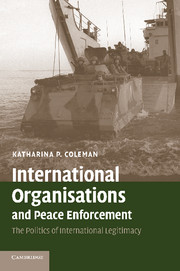Book contents
- Frontmatter
- Contents
- List of maps
- List of figures
- List of tables
- Acknowledgements
- List of abbreviations
- 1 Introduction
- 2 States, international organisations, and legitimacy: a theoretical framework
- 3 Peace enforcement through sub-regional organisations: the Economic Community of West African States and Operation Liberty in Liberia
- 4 Peace enforcement through sub-regional organisations: the Southern African Development Community and Operation Sovereign Legitimacy in the Democratic Republic of Congo
- 5 Peace enforcement through sub-regional organisations: the Southern African Development Community and Operation Boleas in Lesotho
- 6 Peace enforcement through a military alliance: the North Atlantic Treaty Organisation and Operation Allied Force in Kosovo
- 7 Peace enforcement through a global organisation: the United Nations and INTERFET in East Timor
- 8 Conclusion
- Epilogue: UN intervention in Lebanon
- Appendix: Summary of interviews conducted
- Bibliography
- Index
Epilogue: UN intervention in Lebanon
Published online by Cambridge University Press: 10 November 2010
- Frontmatter
- Contents
- List of maps
- List of figures
- List of tables
- Acknowledgements
- List of abbreviations
- 1 Introduction
- 2 States, international organisations, and legitimacy: a theoretical framework
- 3 Peace enforcement through sub-regional organisations: the Economic Community of West African States and Operation Liberty in Liberia
- 4 Peace enforcement through sub-regional organisations: the Southern African Development Community and Operation Sovereign Legitimacy in the Democratic Republic of Congo
- 5 Peace enforcement through sub-regional organisations: the Southern African Development Community and Operation Boleas in Lesotho
- 6 Peace enforcement through a military alliance: the North Atlantic Treaty Organisation and Operation Allied Force in Kosovo
- 7 Peace enforcement through a global organisation: the United Nations and INTERFET in East Timor
- 8 Conclusion
- Epilogue: UN intervention in Lebanon
- Appendix: Summary of interviews conducted
- Bibliography
- Index
Summary
As this book goes into press, the United Nations Interim Force in Lebanon (UNIFIL) is being dramatically expanded to help address the conflict between Israel and Hizbollah that has devastated Lebanon. The manner in which this crisis was addressed should dispel any remaining doubts about the political relevance of the United Nations raised by the US intervention in Iraq. It also reaffirms the central proposition of this book, which is that the key contribution of international organisations to contemporary peace enforcement operations lies in the international legitimacy provided by their mandate.
The violence that flared in Lebanon and Israel in July and August 2006 has roots in the longstanding Arab–Israeli conflict, but its immediate trigger was the abduction of two Israeli soldiers by Hizbollah on 12 July 2006. Hizbollah, the ‘Party of God’, was founded following Israel's occupation of southern Lebanon in 1982 and, with Iran's help, developed into an important political and military player in Lebanon. It poses a persistent threat to Israel despite the call for the disarmament of all militias in the Taif Accords, which ended Lebanon's civil war in 1989. Hizbollah maintained its commitment to the struggle against Israel despite the latter's withdrawal from southern Lebanon in 2000 and declared 2006 ‘the year of retrieving the prisoners’ held by Israel. It hoped to use the two captured Israeli soldiers in a prisoner exchange with Israel. Instead, Israel launched an economic blockade and intensive air strikes against Beirut and southern Lebanon.
- Type
- Chapter
- Information
- International Organisations and Peace EnforcementThe Politics of International Legitimacy, pp. 314 - 325Publisher: Cambridge University PressPrint publication year: 2007



